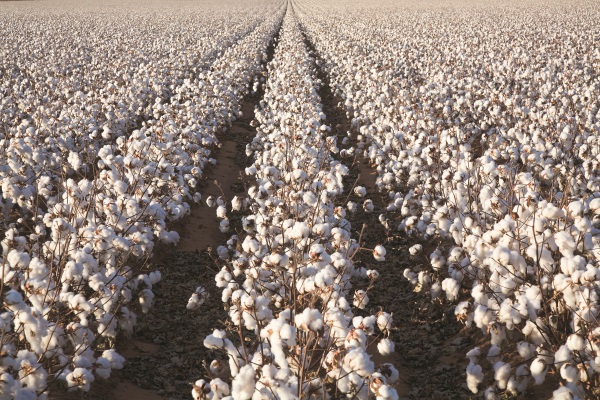Woody Anderson
In the 1890s, the boll weevil crossed the Rio Grande River at Brownsville, TX. Within 10 years, it had infested every cotton-growing area from east Texas to the Atlantic coast.
By the 1900’s, W. W. Anderson, an east Texas cotton grower, decided enough was enough of what would become the most devastating cotton pest in U.S. history. So he headed west to Colorado City on the Rolling Plains of Texas, where the cool, dry conditions were not conducive to boll weevil over-wintering.
But that would change. “In the mid-70s we began to have some heavy migrations, and it got bad in the mid-80s. They had adapted – they seemed to have climatized,” says Woody Anderson, W. W.’s grandson.
Ironically, what drove W. W. west was exactly what drove Woody to an active role in the National Cotton Council (NCC). “I became interested in the National Cotton Council in the early 1990s, primarily because of my interest in the boll weevil eradication programs (BWEP). The Council has been right at the heart of it – both in research and technology.”
Not surprisingly, among the many NCC committees Anderson served on was the Boll Weevil Action Committee. In 2004, he was elected chairman of the National Cotton Council.
In the early ‘90s, Anderson served three years as chairman of the Texas Farm Service Agency. He was appointed by U.S. Representative Charles Stenholm, who was the ranking Democrat on the House Agriculture Committee. Stenholm was one of the most conservative Democrats in Congress, and was the leader of like-minded Democrats who became known as – get this – “Boll Weevils.”
Those would not be the first or the last of Anderson’s cotton leadership positions. Based on his good works for the betterment of the entire cotton industry, the staff of Cotton Grower takes great pleasure in naming Woody Anderson our 2007 Cotton Achievement Award Winner.
NCC President and CEO Mark Lange says, “Achievement is Woody Anderson’s middle name. Along with being an innovative producer, Woody has long been a contributor to the health of the U.S. cotton industry. For several years, he has served the American Cotton Producers and the National Cotton Council in numerous capacities – from working to keep the national Boll Weevil Eradication Program on track in Texas and improving the annual Beltwide Cotton Conferences to chairing the Council’s Farm Policy Development Task Force.”
“As Council chairman in 2004, he testified before Congress on the 2002 farm law’s effectiveness to U.S. cotton and agriculture,” Lange adds. “Anderson’s statement helped to prevent damaging amendments from undermining that important legislation.”
Anderson is the third generation on the land his granddad settled. “I left for a while and went off to school at the University of Texas,” he says. “I went down there to become a lawyer, but I decided I couldn’t wear a coat and tie to work every day and sit between four walls.
“People ask me all the time what kind of ag degree I could get at UT, and I told them I didn’t need one – I got it growing up,” says Anderson. What he got was a degree in journalism and public relations. “There has not been a day that I haven’t used it in some way or another,” he adds.
He returned to Anderson Farms for good in 1974 to work with his father Warren. “Probably in the back of my mind, I always thought I would come back to the farm,” he says. His brother Randy joined the operation 10 years after that. Later on, the Andersons were named the Colorado City Chamber of Commerce Farm Family of the Year.
Anderson married his wife Susan in 1972 while he was working his way through school for the Texas Dept. of Agriculture.
They have two children. Their son Brad, 29, is a lawyer with the Jackson Walker firm in Austin. Their daughter Kendra, 26, is an assistant basketball coach at Charleston Southern University in Charleston, SC. She was a basketball All-American at Hardin-Simmons in Abilene.
Anderson has a sister and another brother. His brother Les is with Sears in San Angelo; his sister Kathy Cash in a speech therapist in Heavener, OK.
As a representative of the U.S. cotton industry, Woody Anderson has traveled the globe.
Brazil
In 2003, Anderson spent 10 days touring Brazil.
“Brazilian cotton growers are very well educated – many U.S-educated – and they know what they are doing,” he says.
Last April, Brazil claimed victory in its case before the World Trade Organization against the U.S. cotton program. Brazil argued the program was responsible for driving down world cotton prices, consequently causing harm to Brazilian farmers, while increasing the U.S.’s share of the global cotton market.
“I am not a lawyer, but I have read the critical parts of (the decision). They think the U.S. is a big, rich country with a history of subsidizing agriculture, and any sort of subsidy is trade distorting,” Anderson says. “I think everybody in the U.S. cotton industry is for free trade. You have to be, philosophically – that is what our country is founded on. That being said, there is no such animal, particularly in the WTO. Everybody is subsidized.”
West Africa
As NCC chairman in 2004, Anderson spent nine days in West Africa, and says the trip was probably the most memorable of all. His participation in the tour was initiated by the National Cotton Council and conducted by USDA. He was the only grower included of any crop.
“The West Africans were, and still are, arguing that the U.S. cotton program has elevated their plight and poverty,” he says. “ … Everything is controlled – all the farmer does is provide labor,” Anderson continues. “It makes it difficult for them – they don’t even know what they get for their cotton, or who it is sold to. … The grower actually gets very, very little.”
So why is the U.S. perceived as being responsible for the rank poverty? “This is what they have been told by certain monopolistic groups that are controlled by outside interests, and what is left from the governmental groups that ran agriculture before privitazation,” Anderson says. “ … When you look back at the history of the cotton industry, they are where we were 100 years ago.”
China
Also in 2004 as NCC chairman, Anderson visited China.
“One of the interesting things we saw was at a textile mill in the lay-down room,” he says. “The mills are very modern and clean, but they had people picking out all the contaminants in Chinese cotton. We saw cotton from India, Viet Nam, and from other places. The packaging was horrible – a lot of extraneous matter.
“I came away thinking that unless China’s warehousing, ginning and other infrastructure involved with moving cotton from the field to the mill improved, the future is pretty bright for U.S. cotton, if they’ll just fully open their markets.”
Does China see the U.S. as a reliable and consistent supplier of quality cotton? “They do,” Anderson says. “But they are also very cost conscious. … I don’t think we have the markets we should have in China, and that is partly because of the WTO. … We are going to have to work through the WTO, and through negotiations, insist that if they want the U.S. to come to the table and open up, then China and everybody else has to, too. Their market has to be transparent and as open as ours.”
Captions:
Woody Anderson and his restored Farmall tractor.
Woody Anderson (second from left) with a group of West African growers.
Woody Anderson meets a member of the China Cotton Assn.









